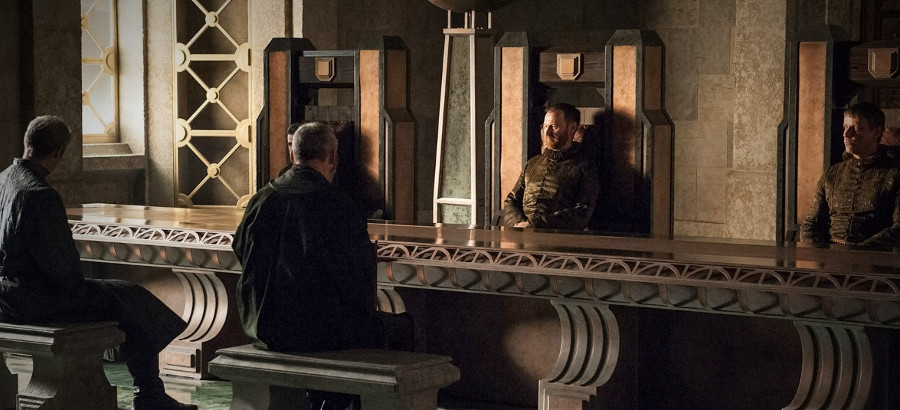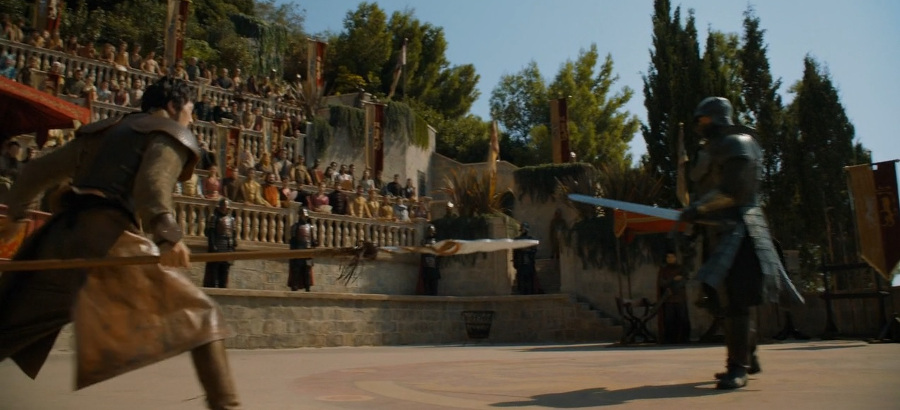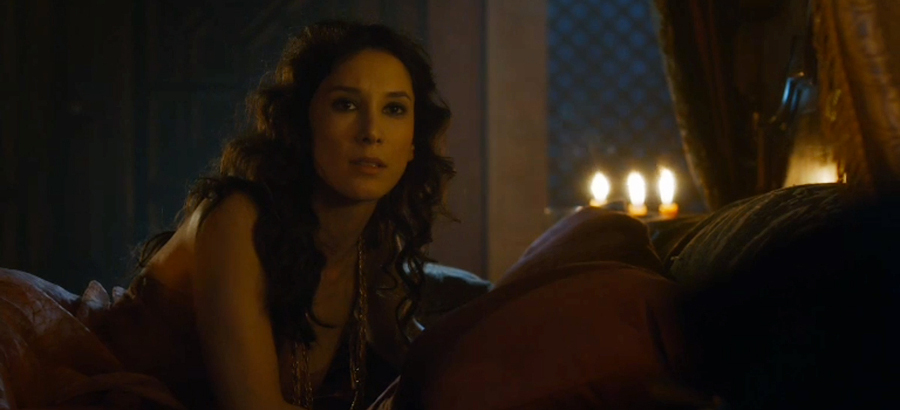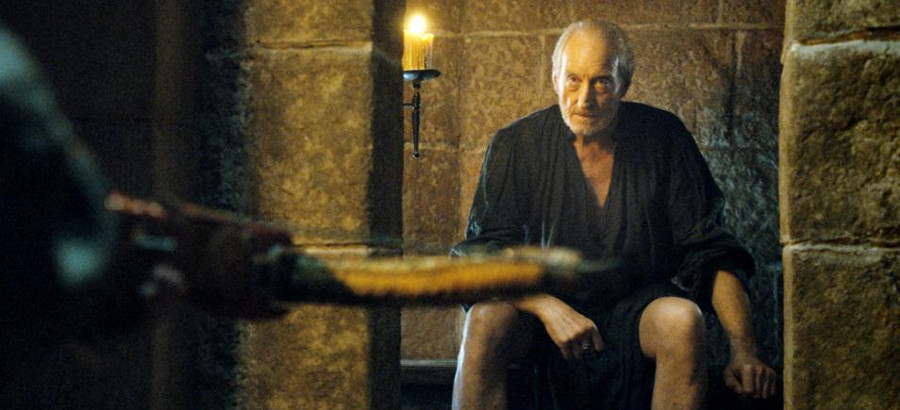Game Over
The Failings of Game of Thrones Season Four
Posted 19 Mar 2015
Game of Thrones is starting to grow soft. No, not soft on brutal violence and the wholesale incorporation of dark themes; all that stuff is still in there. Rather, the show's writing has begun to take a very by-the-numbers approach to its story, delivering more or less exactly what viewers have come to expect without doing anything really surprising. It goes through the motions, and that's all it does. No more really needs to be said, but there's no limit to my ability to carry on about things that irritate me, so let's take an in-depth look at why Season 4 failed to live up to the example of preceding seasons.

Lack of Direction
All the season's problems eventually fold into one larger problem: that there is no singular direction in this season, no one overarching plot that all the other storylines play into. The other seasons used the leadup, climax, and end of the war as a sort of "meta-story" unifies the more personal storylines into the context of a larger arc. This technique worked brilliantly to explore the concept of how individuals' actions affect events on a global scale.
So, with the war more or less over, what's left to do? Well, not a whole lot, as it turns out. The Lannisters have more or less total control of the country, leaving them with nothing else to conquer. Most of the Starks are dead. Neither Stannis nor Daenerys are in a position to begin their invasions, so their activities are largely quotidian. The Greyjoys don't do much of anything. The Wildlings eventually attack Castle Black but we don't see much of their preparations for it. The Tyrells are nonentities. The White Walkers are hardly in evidence. With no particular goals to aspire to, much of the action consists of little more than characters shuttling back and forth between different locations, sometimes with minor skirmishes thrown in. Never do we get the impression that we're witnessing a defining moment in this world's history; it's by and large a story of mundanities, and even some of the more interesting predicaments the characters face prove to be more pedestrian than they have in the past.
By way of example, let's compare Tyrion's imprisonment in Season Four to his imprisonment in Season One. In Season One, Tyrion's prison is a terrifying "sky cell" in which falling asleep would mean likely death. The scenes which take place in his cell involve his attempt to bargain with his jailer in order to secure an escape by guile alone. In Season Four, Tyrion spends his imprisonment in a very generic cell. Sometimes people visit and he talks to them for a while. He doesn't bargain or scheme, he just sits there. While this may be realistic given his mental state, it makes for lousy storytelling. Realism does not an engaging storyline make (at least not necessarily).
Characters who don't do anything are uninteresting by definition, and yet inaction has become an epidemic in this season. Daenerys spends most of her scenes receiving petitioners in her throne room. Jaime mostly just talks to various people. The Boltons conquer a castle, but one of so little plot significance that we've never heard of it before. Stannis goes to the bank to apply for a loan, and is forced to pace in the waiting room for a while. You can feel the excitement.
Even the season's climactic moment, the Battle of Castle Black, has very little in the way of a lead-in. While we know the Wildlings intend to attack the Wall, few of the characters outside of the Night's Watch seem to give it any thought at all. (This is realistic, yes, but again, realism does not imply good storytelling.) The most interesting lead-up to it involves the Night's Watch launching a counterespionage mission to prevent the Wildlings from collecting strategic data from Craster's Keep, but in the end this seems to be little more than filler, since the Wildlings attack with full force despite not having the information. As for the Wildlings themselves, they don't get much screentime: Ygritte's group conducts a few raids, but the group north of the Wall gets no pre-battle scenes at all. Thus even the eventual battle isn't really the summation of the season overall, but simply the summation of a minority of plot threads with no engagement to the rest of the story. Compare this to the Battle of Blackwater Bay or the Red Wedding, both of which were the logical conclusion of several different story arcs meeting simultaneously. While the battle episode is excellent, it is still emblematic of a season that really didn't know what it wanted to do.
Naturally, it's not uncommon to have a "lull before the storm" in a narrative. Perhaps it was the creators' intention that this season be a quiet period leading up to a climax in the following season. If so, the lack of direction undermines that as well. Each season must foreshadow the story bits that will be important in the next, but with a few exceptions there's not a whole lot on the horizon to look forward to. The season leaves the characters going about business as usual with little relevance in the grand scheme of things, and as such doesn't really offer any hope that the next season will be any improvement.

Missing Characters
Much of this show's strength has been in its large cast of well-developed characters and the way that they reveal themselves through their interactions. The greatest scenes, for me at least, aren't the literal battles but battles of wits: the veiled threats exchanged by Varys and Baelish, verbal sparring of Tyrion and Cersei, Melisandre and Ser Davos's tug-of-war for Stannis's allegiance. Moments of bonding are equally memorable: Jaime opens up to Brienne about his side of the "kingslayer" story, Cat recounts Jon Snow's childhood illness to Talisa, Tyrion and Shae exchange vows of loyalty. Such scenes are the foundation of any character-centric narrative. Without them the audience has no insights into the characters or (just as importantly) their relationships to each other.
Season Four is largely lacking in such scenes. Many characters with developing or ongoing relationships (including nearly all of those listed above) have been separated or killed, thus rendering dialogue impossible. Most of our main cast members' interactions are with relative nonentities: Jon Snow argues with Alliser Thorne, Ygritte talks to Tormund, Sansa learns Dontos's backstory. If you can't place some of these names, you're not alone; I had to look them up myself. This is not to say that any of these characters couldn't be made strong, but as things stand a character like Thorne isn't as developed as, say, Tywin, so his behavior simply doesn't have much visible complexity to it. He argues against Jon's plans simply because he doesn't like Jon, not because he has any sort of agenda of his own. Thus, while there are still plenty of characters on screen, most of them simply aren't that interesting.
Other characters, meanwhile, are either glossed over or left out entirely. The most noticeable example, I think, is that of Theon's sister, Yara Greyjoy, who in the previous season finale vowed to rescue him. Though this was implied to be a major plotline in the future, the followup was ultimately a relatively brief sequence taking place in a single episode. She arrives at the Dreadfort, sees that rescuing Theon is futile, and abandons him for dead. We don't see any of her preparations for the attack, nor do we learn her feelings afterward. Her presence in the story is so minimal as to feel like filler. Some other characters, such as Varys, still appear in multiple episodes but have relatively little storyline engagement. And finally, a few characters have been written out of the story completely, such as Osha (the Starks' Wildling ally) and Gendry, don't make a single appearance in this season.
Character development is at a minimum here, too. For the most part this issue is due to the fact that so little happens in this season, but even characters who have ample opportunities to change don't tend to do so. Arya in particular stands out to me in this regard. While I wouldn't expect her animosity toward the Hound to to evaporate completely, her decision to let him die in agony seemed downright cold-hearted, flying in the face of the improved respect she'd shown him in recent episodes. At least Arya gets opportunities to grow, however. Other characters aren't so lucky, and tend to show little more than the most superficial personality traits: Cersei is mean, Tywin is cold, Danaerys is naive and merciless, Sansa is helpless, Baelish is a slimebag, and so on. Particularly noticeable in this lineup is Theon: given that his will has been completely broken, he's effectively become a non-character, incapable of development. Character change is necessary for character-driven fiction, so why is it not in evidence here?
Another technique largely missing from this season is the influence of characters' decisions on the plot. The eventual downfall of Robb Stark is more or less entirely the summation of his own rash decisions. (Most notably, his decision to betray his promise to Walder Fray, his decision to execute Rickard Karstark, and his decision to ask Fray for support despite his betrayal.) Had he behaved differently, he conceivably could have won the war, but his decisions ultimately spell his doom. This is character-based plotting, one of the most powerful narrative techniques, reconciling two elements (plot and character) that often operate apart from each other. We don't see this technique used here. Tyrion's downfall (the closest this season comes to an overarching narrative) is partially his fault, but the accusations that bring it about are entirely circumstantial. Most other characters' story threads are so insubstantial that character-based plotting isn't even conceivable. Many of the series's strongest story arcs took advantage of this technique, and its absence here is regrettable.

Predictability
I never thought I would say this, but the show has become predictable. Joffrey's death is probably the most surprising thing this season offers, but it's out of the way quite early on, and most of what follows doesn't have the kind of complete unexpectedness of Ned Stark's death, the Red Wedding, or the loss of Jaime's hand.
One notable example occurs during the duel between the Mountain and Tyrion's champion, Prince Oberyn. By the point it occurs, I think most viewers have become jaded enough to the show's tricks to know that the fight won't end well, and herein lies the problem. When Oberyn initially defeated the Mountain, I was more surprised by that than I was that Oberyn got killed anyway. The show has so trained us to expect the worst that it has created its own sort of predictability, one in which we are suprised not when bad things happen to people, but when good things do.
This is a serious weakness, especially for a story that made a name for itself by killing off its central protagonist before the end of the first season. Once shock value becomes the norm, it's no longer shocking, particularly in situations where a "Chekhov's gun" is clearly in effect. It seemed a foregone conclusion that someone was going to get pushed through the Moon Door, so I was hardly surprised when Baelish shoved Lysa out of it. Even the deaths of Joffrey and (I presume) Tywin didn't seem surprising, but inevitable: "well, they had to die sometime." Character deaths in Game of Thrones have begun to feel like a magic trick repeated too many times: eventually it loses its mystique.
This is all symptomatic of the series having fallen into its own routine. The writers seem convinced that making bad things happen to characters is the same thing is drama. It is not. In Season Four, things don't happen because of the characters, but rather they happen to the characters: the difference between drama and melodrama.

The Death of Shae
For the most part I've been discussing the season in general terms, but there's one event I want to discuss more specifically: The death of Shae is one of the most egregious examples of character derailment I've ever seen in my life.
To recap: Tyrion, in an effort to ensure Shae's safety, wants her to leave King's Landing, but her attachment to him is such that he has to outright insult her to get her to leave. She sees this as betrayal, and out of spite she testifies against him at his trial. This is all understandable and fits with her character as it's been depicted so far. What's staggering, then, was the decision to end the season with the revelation that Shae has been willingly sleeping with Tywin, and had even begun to address him as "My Lion." This is probably the biggest surprise of the entire season, but for the wrong reason: it's surprising because it makes no sense.
For Shae to have turned her back on Tyrion so callously and so completely, we can only assume that she never actually had any true feelings for him in the first place. She appears to have become Tywin's mistress without reservation, despite the fact that Tywin lack's Tyrion's good qualities. Even more boggling is the fact that Tywin's vendetta against Tyrion's "whores" was the main reason Tyrion sought to keep Shae hidden in the first place. So for this to work, Shae has to have been a prostitute, no more no less, through this entire series, her loyalty easily bought and her proclamations of love completely empty.
However, this explanation not only cheapens the character but is completely incompatible with everything we know of her. She is not easily bought. Varys tried to pay her handsomely to leave King's Landing, and she refused. Tyrion tried to dismiss her after his fall from power following the Battle of Blackwater Bay, and she insisted that she would stay by him with or without pay. She even struggled through the constant humiliation of Tyrion's marriage to Sansa. These are not the actions of a person who would be willing to hook up with her lover's evil father for money or for spite.
To look at this from a writer's perspective: Let's say, for the sake of argument, that Shae needed to be killed at the end of the season, and that for whatever reason, we Tyrion should be the one to kill her. How hard would it have been to place her in that room without making her be Tywin's willing lover? At the very least she could be there unwillingly, at best perhaps she's there with the intent of killing Tywin herself. If Tyrion's impression of her as Tywin's mistress was actually mistaken, her death would have been far more tragic. That said, I personally can't understand why anyone thought it made sense for Tyrion to kill Shae in the first place. It's just one likable character killing another, and the situation demeans both of them. That this scene occurs just minutes from the end of the season is particularly disappointing.

Conclusion
Game of Thrones has become mired in a narrative swamp of its own making. It has placed its characters in situations that prevent them from making use of their strengths. Other characters, far too many of them, have been eliminated or neutralized. Its formerly-surprising plot twists have given rise to its own variety of predictability. This is a disappointing development, one which I never expected to see on what was, up to this point, a very well-constructed story.
Can the series be salvaged? I'd like to hope so, although it will be an uphill battle. Much of what hampered this season is positioned to make the next season just as difficult. To be successful again, the show will need to add more characters, particularly characters who are both complex and likable. These characters must have a direct stake in the larger scope of action, and their decisions must impact the course of events. It must strive to come up with new ways to be surprising, as simply killing off characters left and right has lost the dramatic impact it had before. Most of all, it needs to take a risk and break its own mold.
Images are property of HBO.